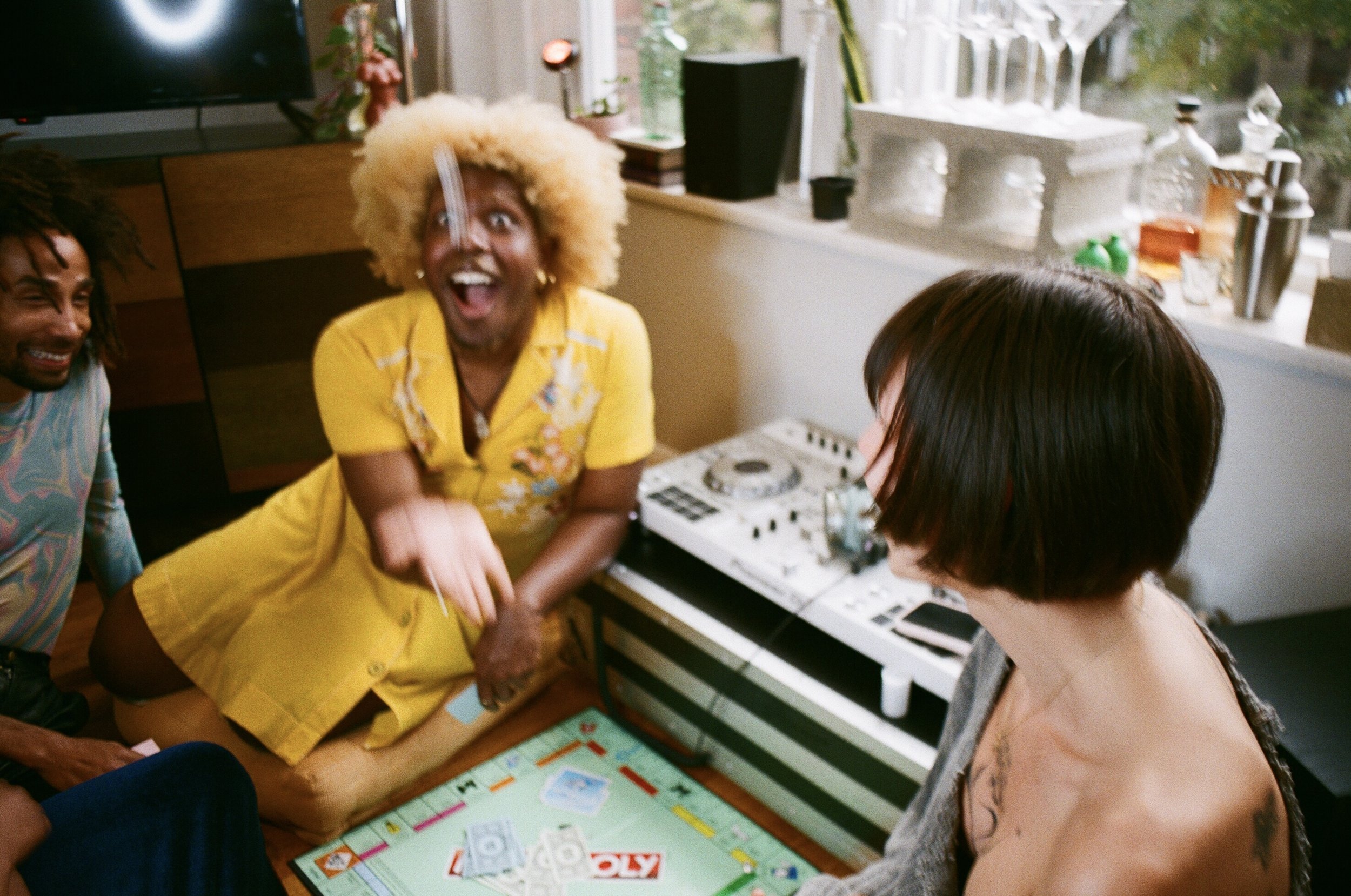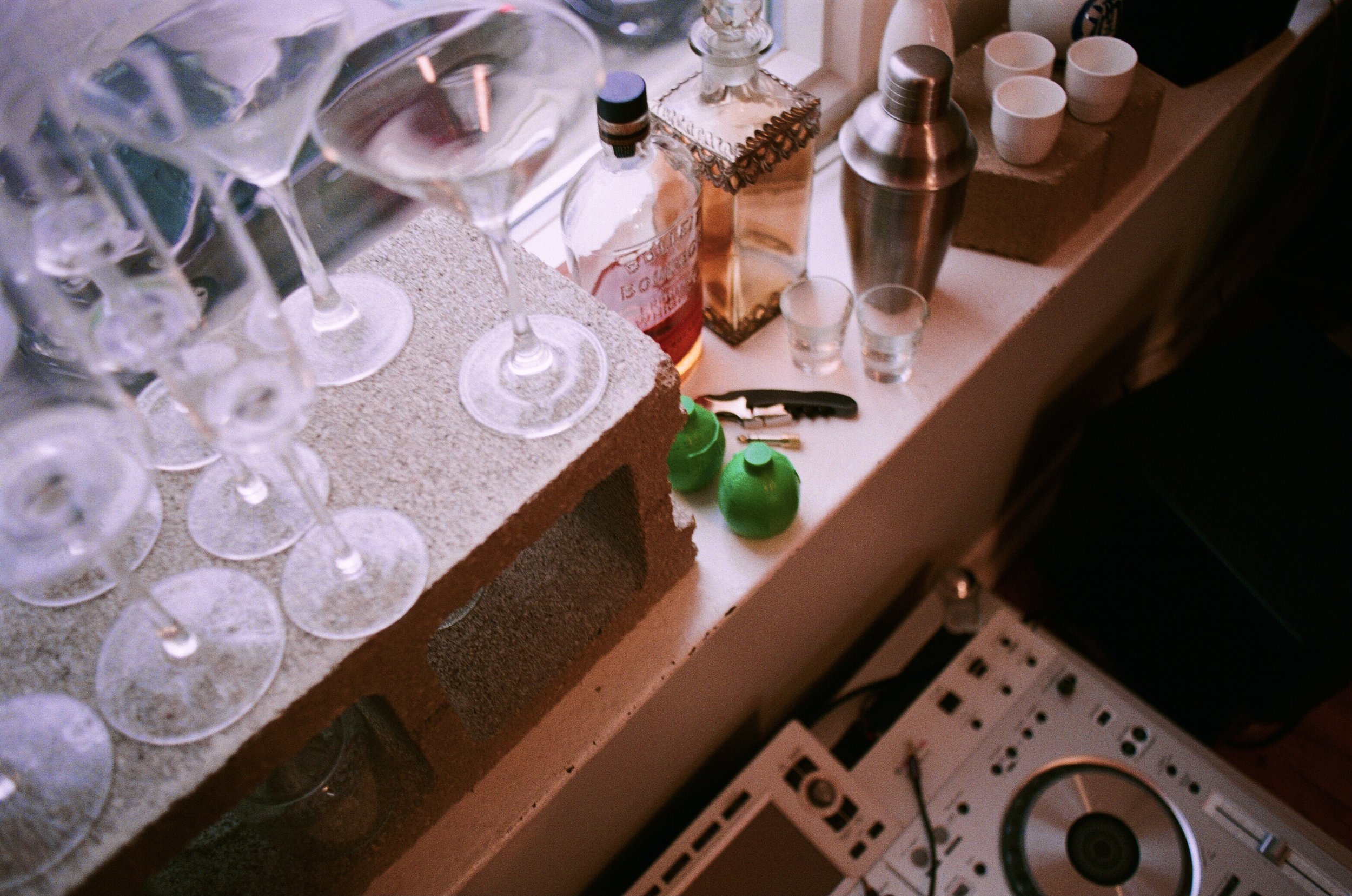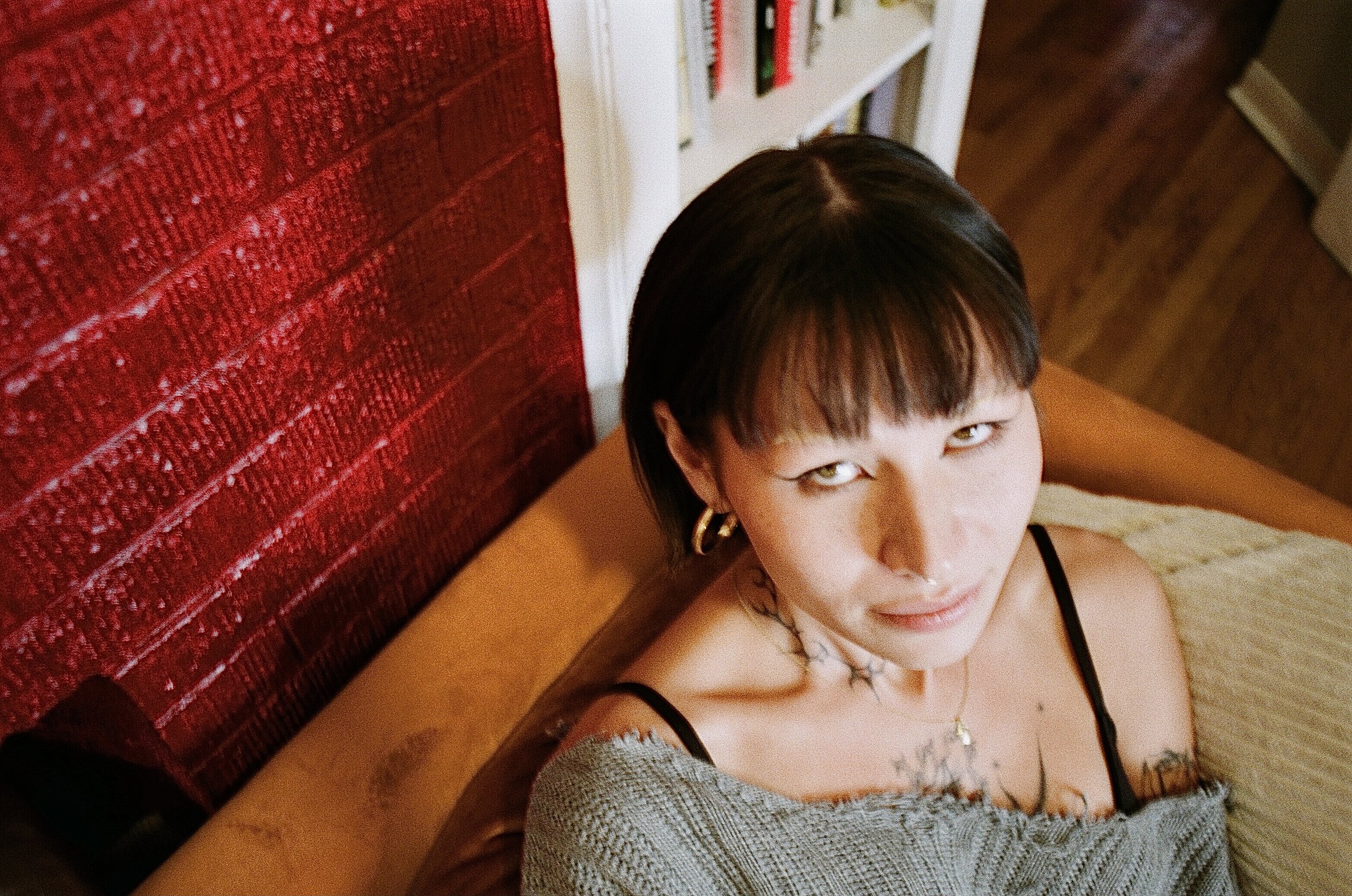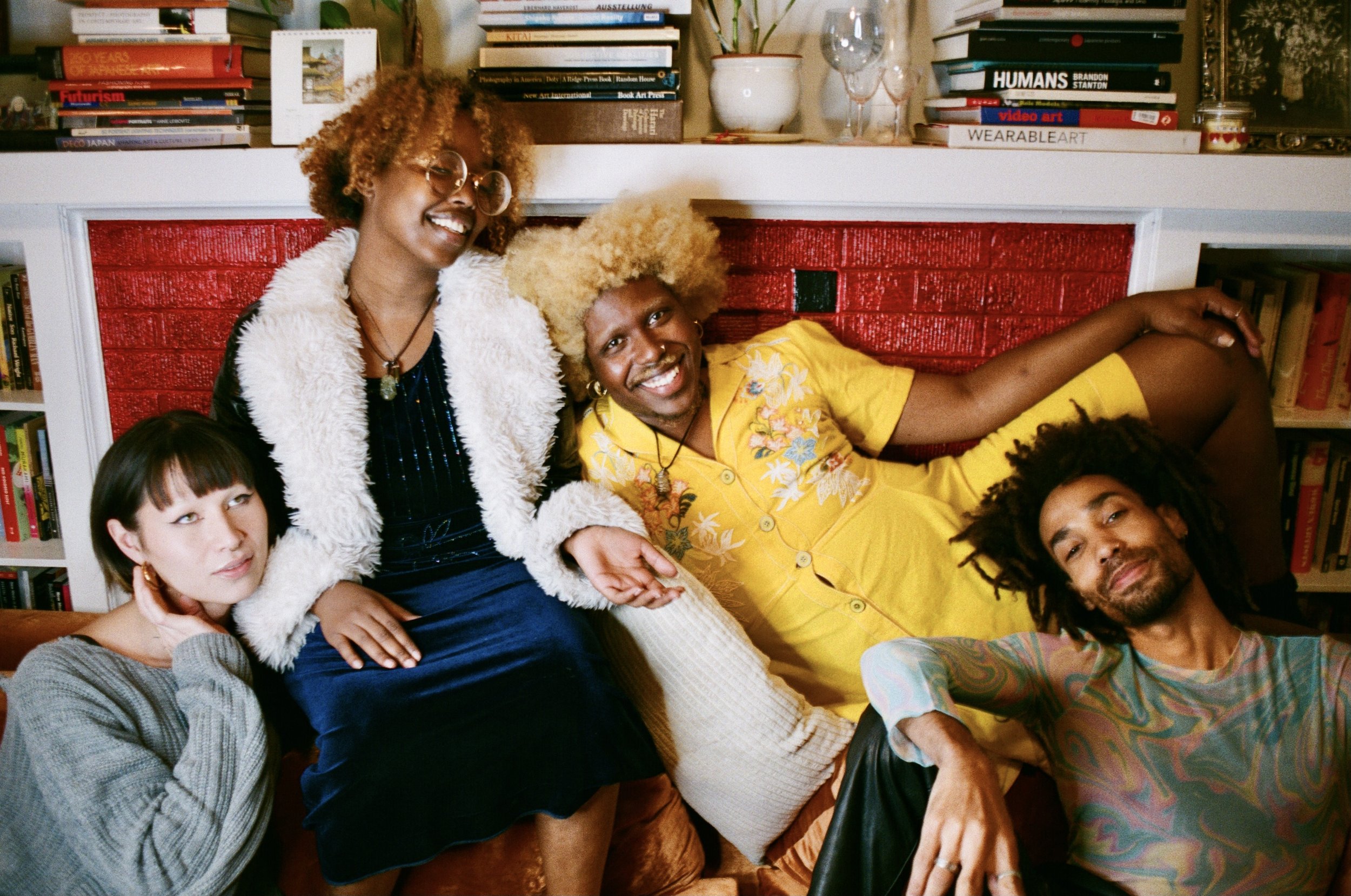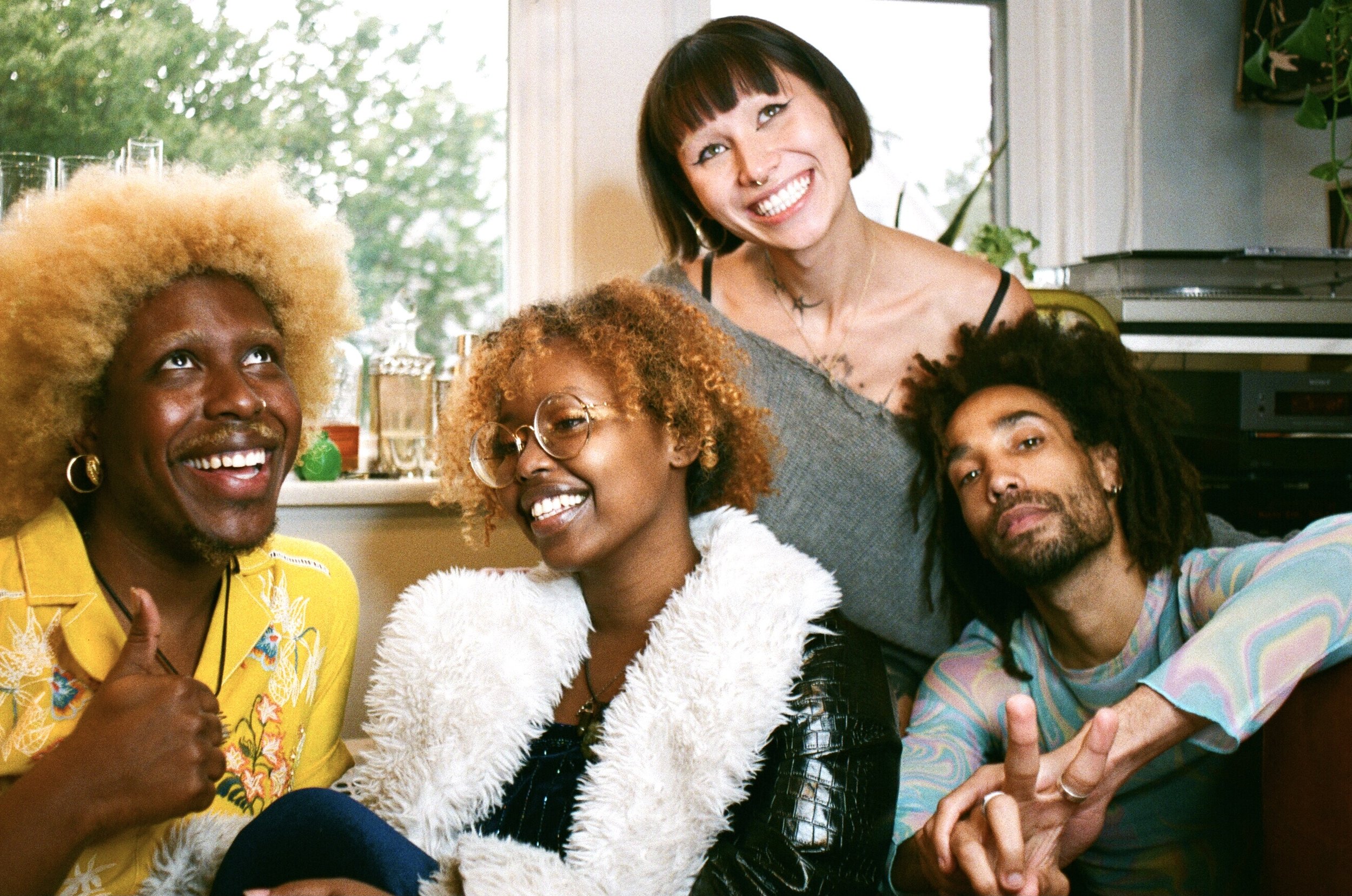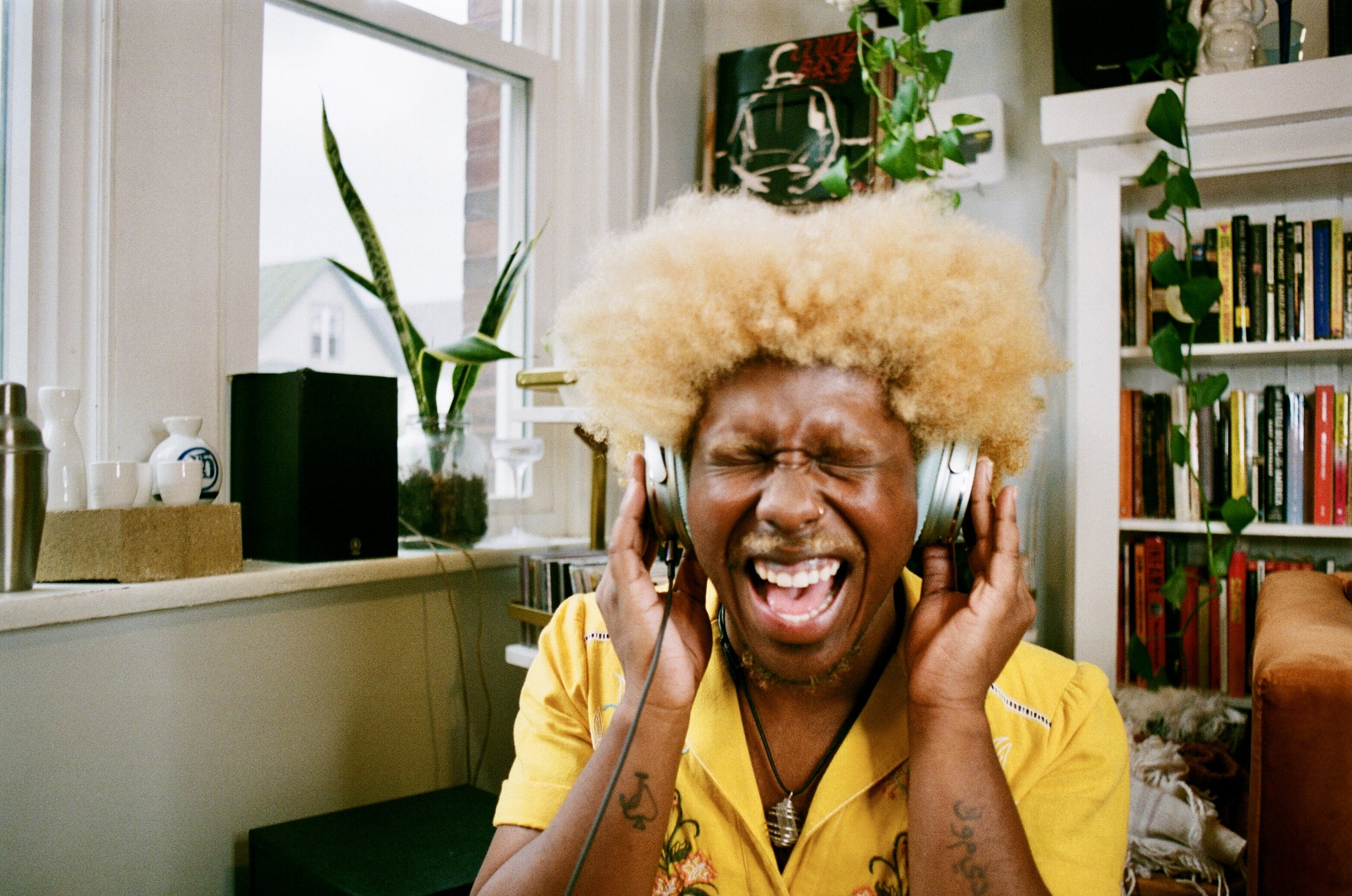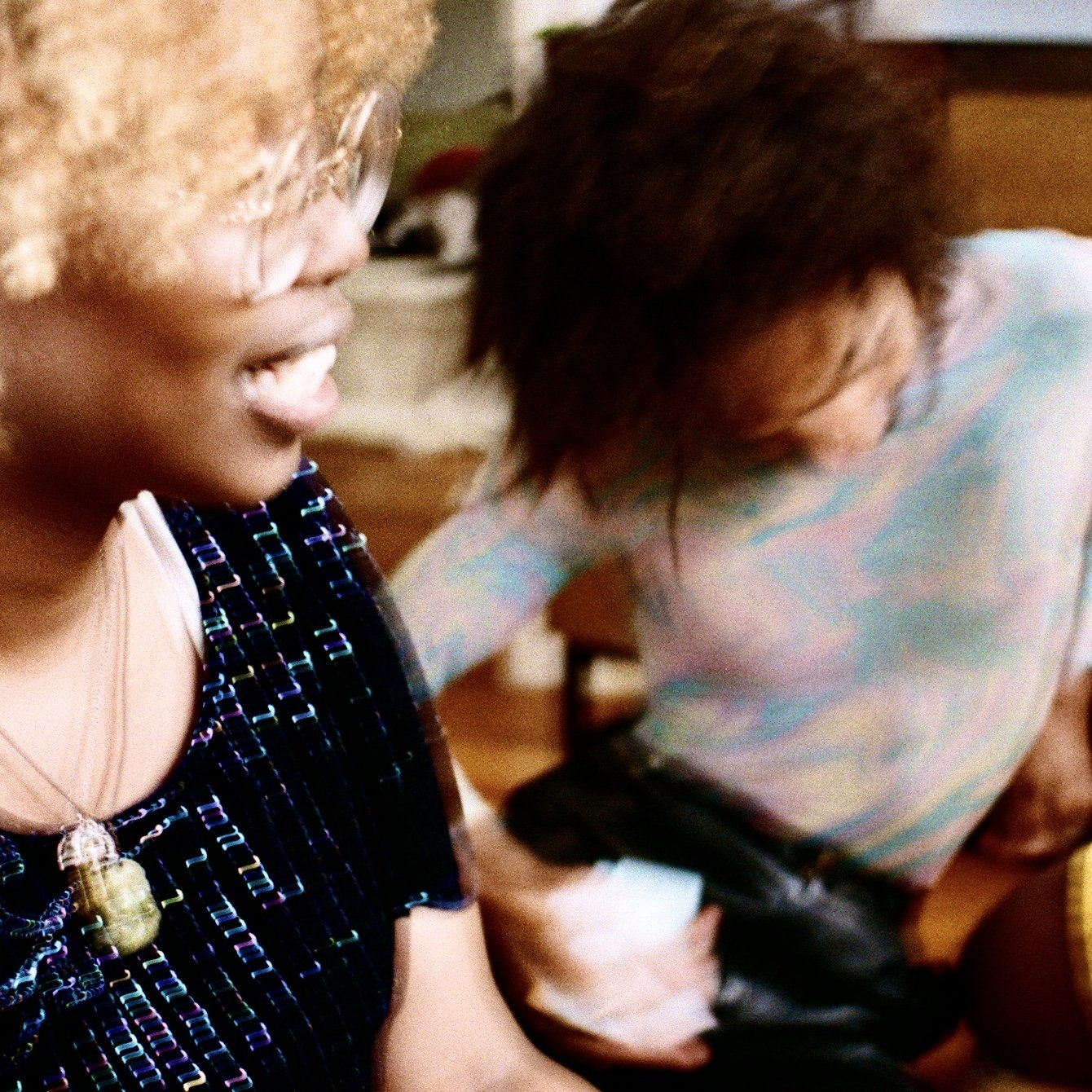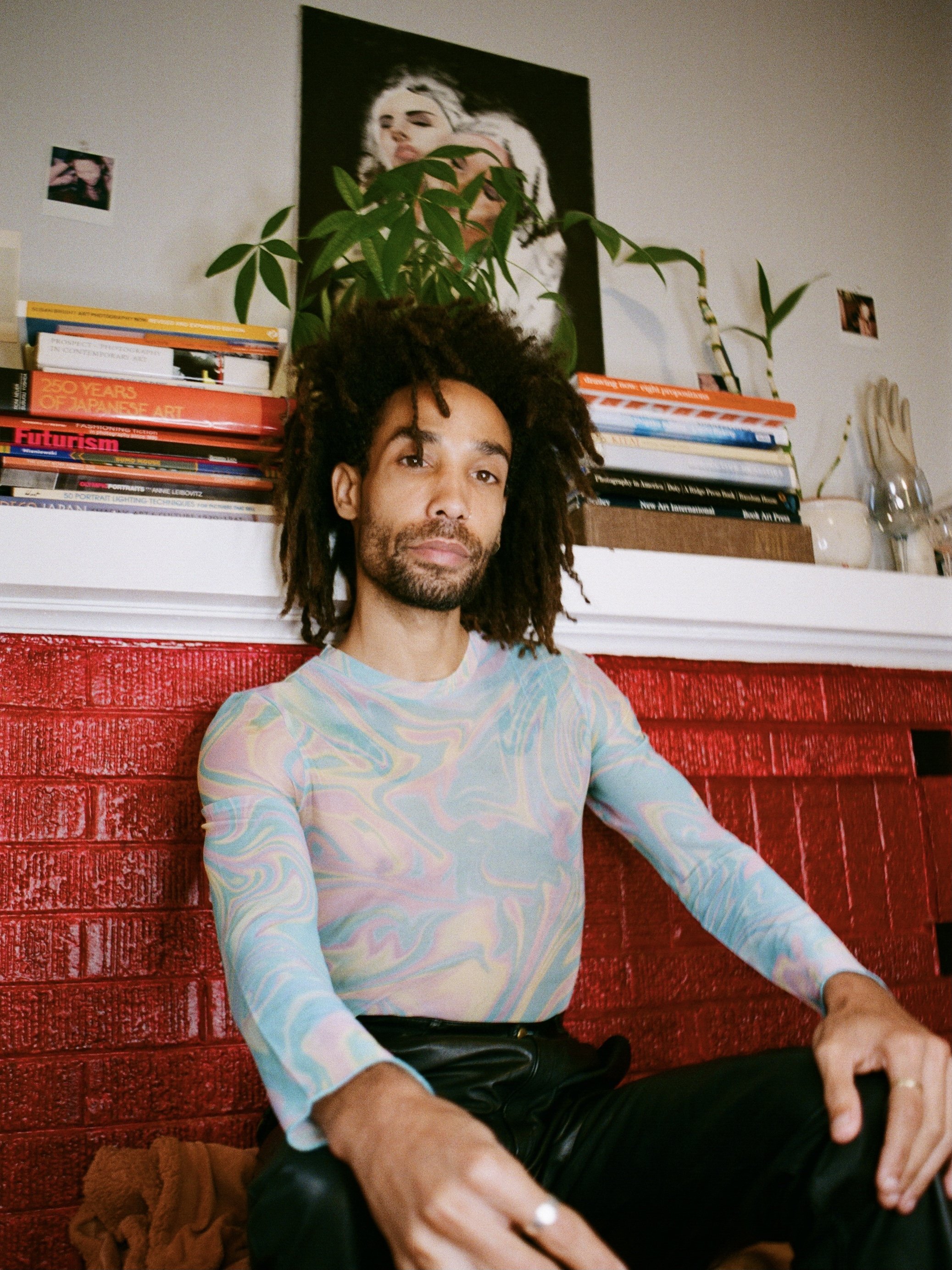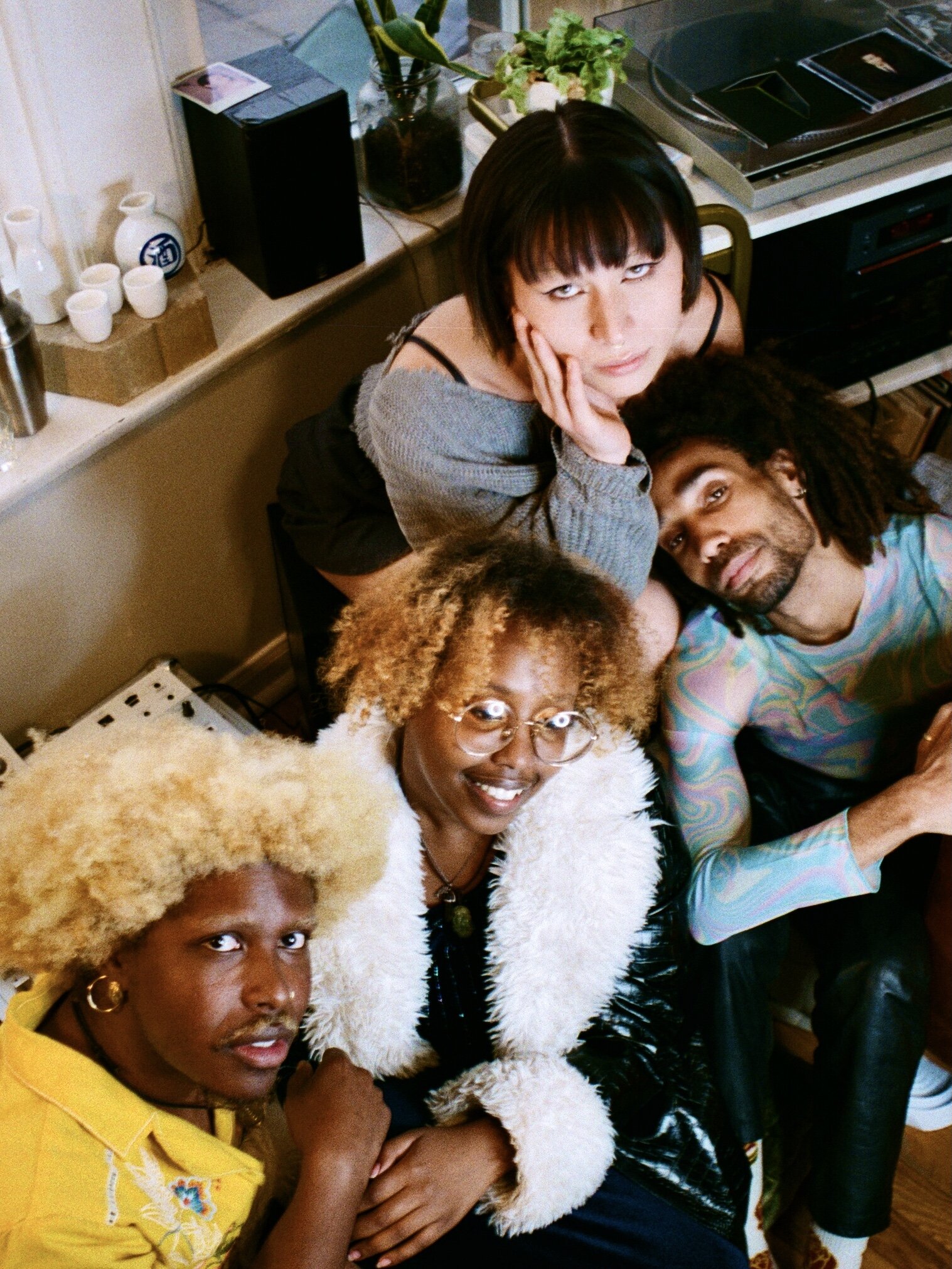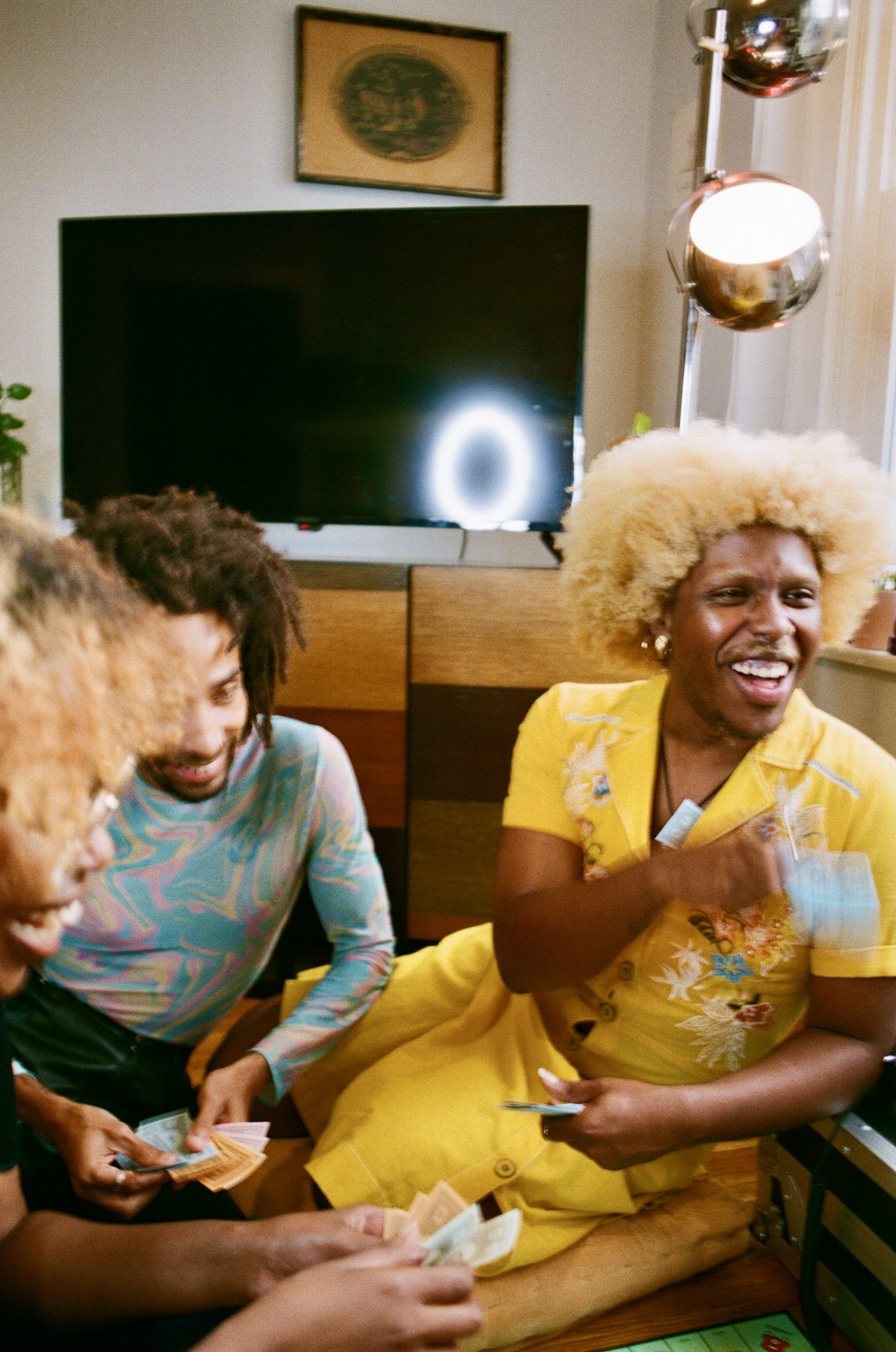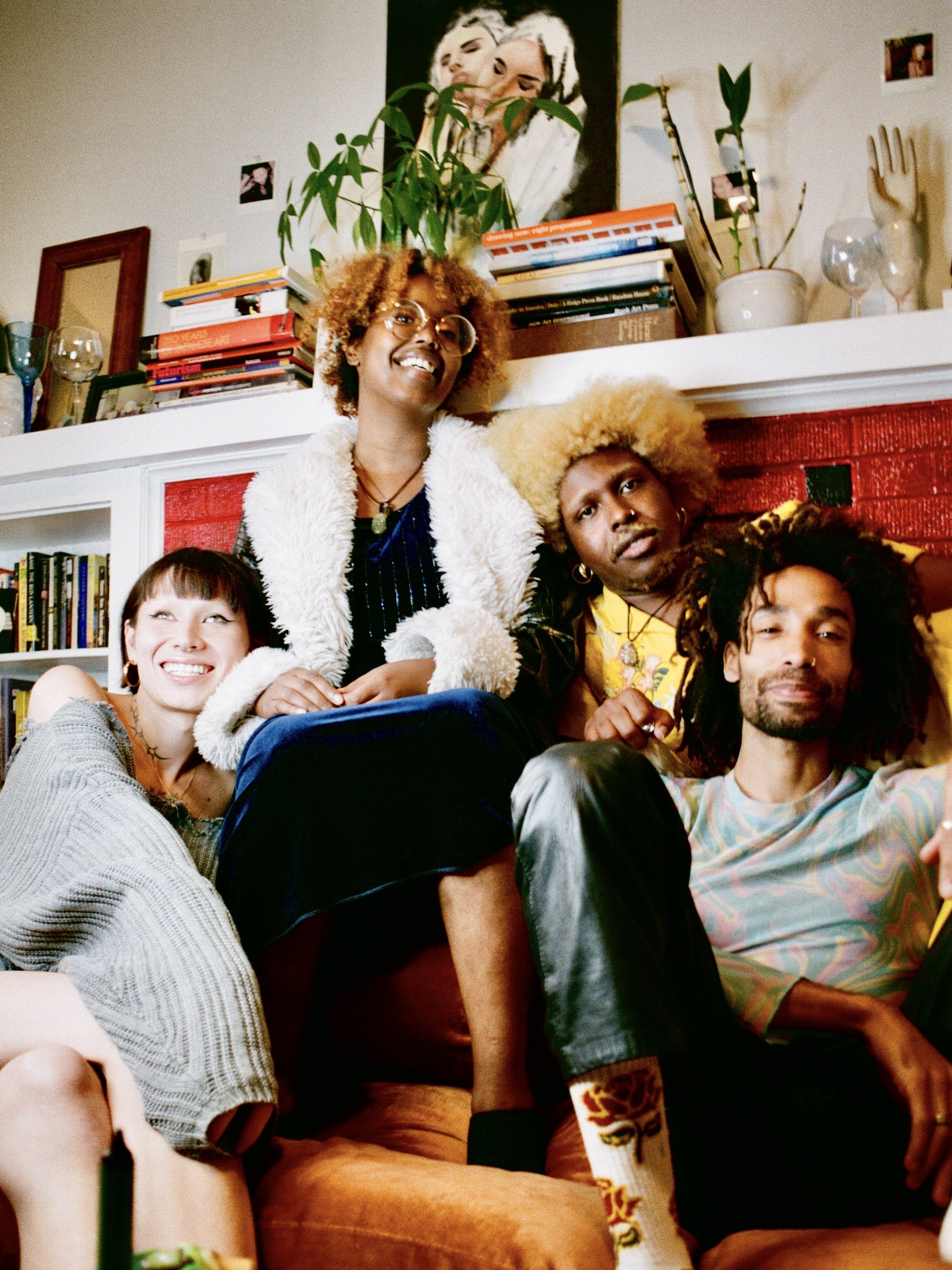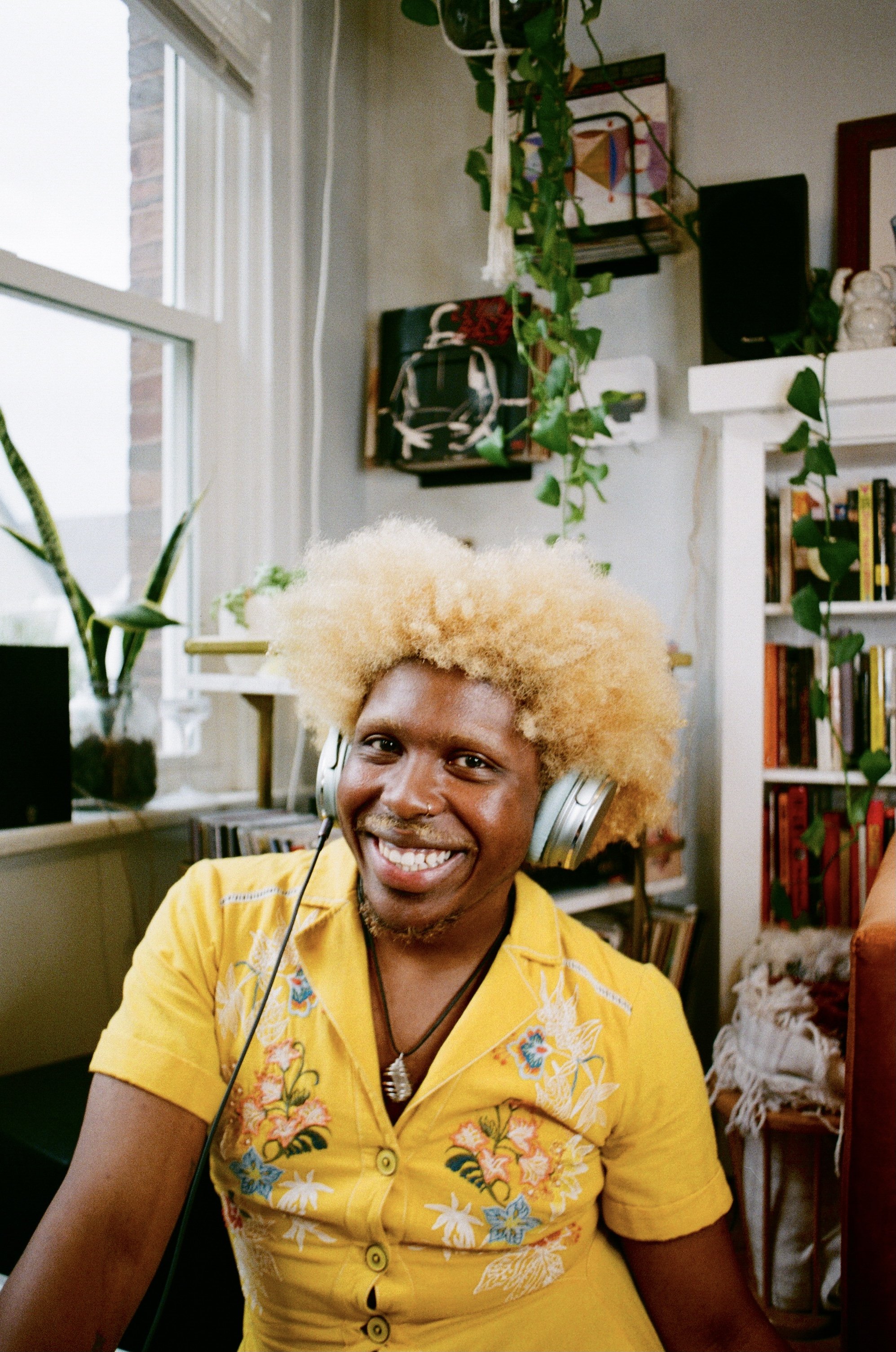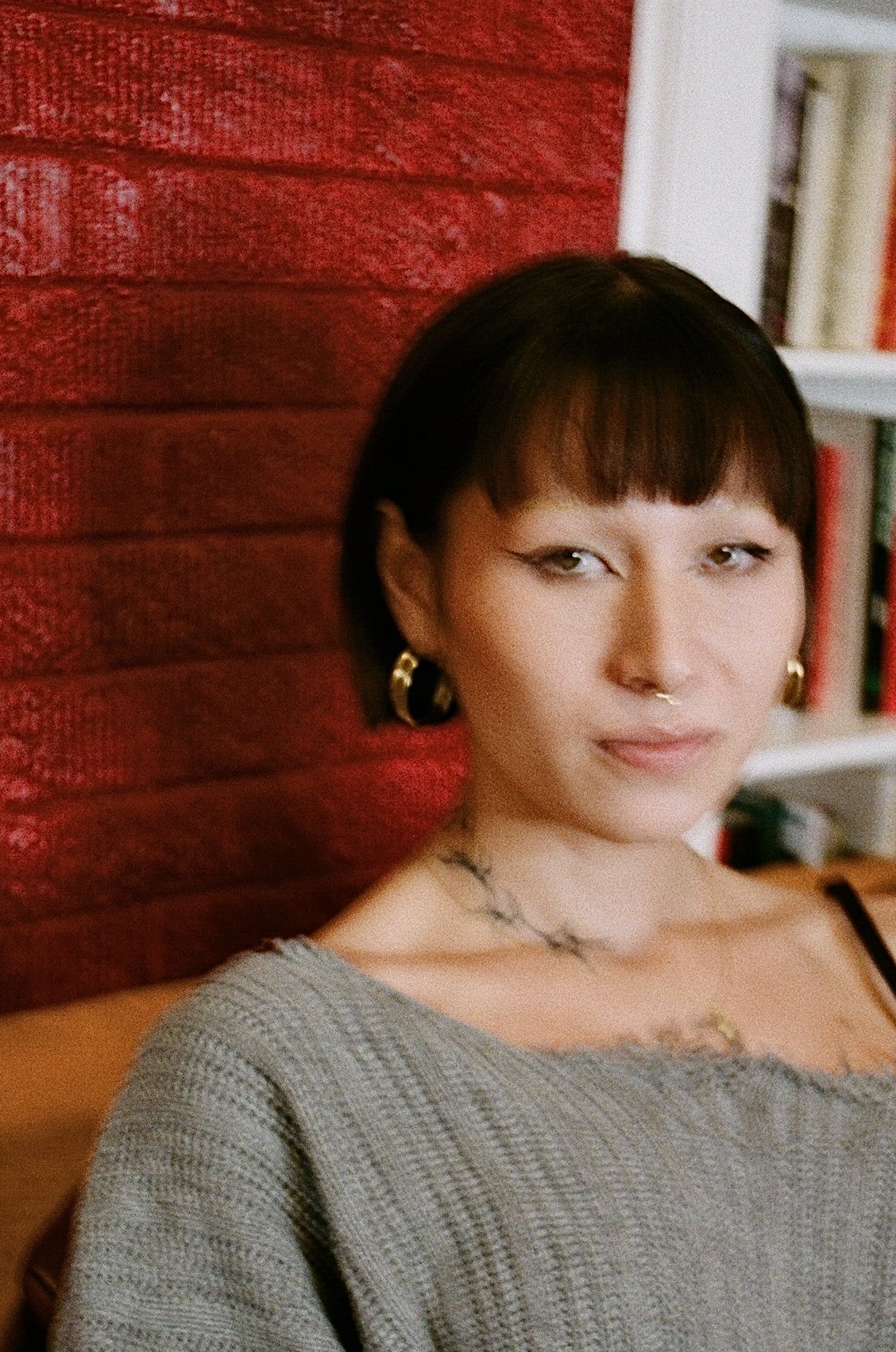The Team Behind Fortune
Photos by Andrea van den Boogaard
Amplified meets with the artists behind recurring Hideout party Fortune to discuss dance liberation, local inspirations, and radical community building for QTBIPOC space in Chicago.
S: Shomari Daniels “Zeetus Lapetus”
A: Antonio Robles Levine “Blesstonio”
J: Jaxx Masada
H: Hafsa Guled “Ayeeyo”
Amplified: Each of you brings something unique to the team behind Fortune. Could each of you talk about your creative background and what role it plays in your collaboration as a collective?
J: So, I’m the only bitch here that doesn’t DJ. (laughs) I have no musical background whatsoever. My main background, creatively, is that I went to school for fashion design and performance art. I was a circus performer for twenty something years, so I do a lot of that, and now I work as a full-time tattoo artist and model. When I’m not doing that, I work as the host of Fortune.
I handle any administrative coordinating, our communication and back-end things, and setting things up for the actual event itself. And Shō, Hafsa, and Antonio fully take the wheel when it comes to music curation, and we all make our decisions as a collective together. At the actual event, I’m there to facilitate and make sure people are feeling good at the party, that everyone is feeling checked in on… I debrief you about the door and about the intentions that we have as a group for the event itself.
A: My creative background starts when I was, like, 6… My mom as a single mother was very adamant about putting me in afterschool programs, so I started in Chicago Children’s Choir growing up. And then when she got remarried, I switched schools, went to a private school, and in fifth grade we started our music program. And I really gravitated toward the cello. So I started playing cello and I just really went with it seriously until my freshman year of college. I was in CYSO, a classically trained cellist, and I was really in that world. It gave me a great understanding of theory and foundation of music. I kind of fell out of it after college, and the rigidity of classical music, and I went into music production and DJing. I was doing performance art, theatre, comedy, and dance, and I dabbled in a lot of creative endeavors… But my 20s I’d really say was mostly about foregoing this rigidity of music and switching into my own production and working collaboratively. So I bring a lot of my former creative practice to Fortune.
I’ve always really believed in eclecticism. My dad would always listen to XRT growing up, so I was really entrenched in classic rock, and I really loved hip hop growing up, and later on I loved bachata music. And I love dancing, moving my body, and expressing myself through that. So when we all met up after Jax’s birthday to discuss a Hideout residency, I really wanted to bring forth this open format for music, and really allowing us to play whatever the hell we wanted to, and whatever it means to us. I’m really dissatisfied with rigid sets that have one lane – That’s great if you’re a DJ who wants to do that, I’ve done sets like that as well – However, I never wanted us to limit ourselves and the range of music because I’ve always had my foot in so many different realms. And I really like that that’s what our strength as musicians and music creators is - One, being able to give people, and ourselves, the music that we want. (Say, if we were a punk kid growing up, we bring that to the table. If we were a classical kid growing up, we can bring that to the table. And now, if we’re in house music we’re able to bring all of these different sounds and tones together.) And [two,] we all really love dancing, and I feel like it’s somehow rare to see events in Chicago be dance-focused… even though they’re playing electronic dance music. So having the intention in saying that it’s a dance-focused event is a great start. Dance and music and eclecticism is really what I bring.
S: I started out as a river dancer when I was in second grade, deadass. (laughs)
H: Slay.
S: Slay! (laughs) And I would always feel cadence in music and know when people need to move to a certain beat, and find the beat in music. My mom raised me on oldies and disco… and there was no hip hop in the house. It was those two and gospel music. So those were some influences in my life. And as an only child, I would listen to a lot of classical music, like Tchaikovsky shit, because I loved the nutcracker. And so I’d be by myself in my house, like, (nutcracker dance).
J: Okay, miss Nutcracker! (laughs)
S: Literally! The different places, and getting to know people has taught me how to adapt to an audience and things like that. Especially since I was raised around so many different types of people. So I feel like putting that within DJ’ing is knowing your crowd, honestly. And while making music like that, it’s knowing when people need to move more, or when you need a slower song so they cannot waste all their energy but still move… And then pick them back up again! So I bring that funky, old-school disco –
J: Nutcracker vibes –
S: Nutcracker vibes, yes! (laughs)
H: My creative background is very funny actually. Because DJ’ing is what I do now, but I started out with growing up in Minnesota, I went to a private Islamic school my whole life, so we didn’t really have a lot of art programs. So the only art that I started doing from a young age was Arabic calligraphy. And as time went on, when I reached middle school I started writing a lot. I got into the creative writing clubs at school, so that’s what I did for a while, and then when I got to college I studied creative writing for a very long time. And it wasn’t until I got to Chicago that I was like, “Oh, wait a second! I want to make films and not just do freelance writing!” So I focused on other mediums, and then I started DJ’ing maybe a year and a half ago, which was when I realized that music was ultimately what I really loved. And I loved parties, like, I loved partying a lot… (laughs) So I felt like something to mesh those two worlds would be DJ’ing. I loved cueing up songs for my friends, and I was always hogging the aux cord and things like that, and was like, “Maybe I should be a DJ…” So that’s how it worked out. I think what bring to Fortune is that I love pop music and I love pop culture, and I feel like I bring in a lot of that energy, but also I love to play music that speaks to my identity growing up as Somali American, immigrant, queer, and all these things. So it’s a mixture of all that jazz put together.
Amplified: So Fortune began this summer, and y’all are going into your third event of the residency at The Hideout. Can you all talk about how you first decided to collaborate?
J: It all kind of started with a birthday party I threw at The Hideout. Before that, even. Our friend, my cousin Lily, threw this party at The Hideout to fundraise for a film that she’s making, and Antonio and Shō and Hafsa were all DJ’ing at this event for Juneteenth. But I knew Hafsa and Antonio and Shō for a long time because I would seek out the three of them to go to events.
S: Our friend Kenya Élan, who actually booked us for The Hideout show, came up to me and Hafsa and was like, “We have a good vibe. We would love for you all to have a residency. Let’s talk about it.”
H: We were in her car.
S: We went to Rumors!
A: Another great dance party.
S: And she said, “You have week to give me a outline of what you want.” So we hit up Antonio and Jax.
J: So after my birthday party, which Antonio and Shō both DJ at, and Hafsa was there too, a friend of mine from high school, Michael Mills – who does booking at The Hideout – came up to me at the end of the party – Mind you, the first proper event that I had thrown – And reached out to me asking if I would want to do this again. As soon as I got that, I texted Antonio, because Antonio was really big in helping me plan that entire birthday. And simultaneously, Michael had asked Antonio, Shō, and Hafsa if they wanted to have some kind of residency at The Hideout, so I just kind of jumped out of the bag, and here we are!
And a lot of my background is in organizational work – I used to work as the programs director of a nonprofit, I run my own business now, and so I felt like I had that to offer, but I was always missing the music component of things. And these three people have a much deeper understanding of nightlife from a more production side than I do, and I was missing that experience, so it felt like I could contribute something.
S: You know that picture of the Power Rangers meeting up with the Ninja Turtles?
J: It was like that.
S: It was like that. Like an Avengers mix. (laughs)
Amplified: Such a big part of the space that you have curated, and continue to curate, is about community organizing and liberation through dance. I wanted to ask you what that means when you’re curating the energy of the space, and what ingredients you’re looking for when you’re building it.
A: I think when we came together, this was my second residency. I had one in California when I was DJ’ing up there. And when I was up there, I was really interested in working with college students. And UCSB unfortunately has a really high rate of domestic abuse and college rapes that happen, and there’s a really prevalent fraternity life. And I was really trying to combat that culture. And when I was working in a team full of people, I was the only DJ, and I was really coming at it like, “We can’t let this shit happen.” I’ve come to frat parties, and I can’t be in a space that I curate that isn’t safe. And I was really a proponent of making sure we set our intentions on the fliers, to make sure that we’re doing these things right from the get-go and following through with what we’re doing. So I came to Fortune with that mindset. And ever since those three years, I’ve been really invested in club culture around the world, and I was doing some research about Nowadays, and I felt like… A lot of people can throw parties. You can get your friends together, you can go to a house, you can get some music on, it’s an awesome time. You can do a lot with a little. But I feel like what’s missing in Chicago is this lack of intentionality. There’s kind of a bastardization of what this word “host” means. Like you can go to any club where they have a host, and it’s someone who dresses up, they look cute, they’re kind of like a celebrity in a sense, and they’re there like a presence. Which is cool.
J: Like someone in drag is typically the host.
A: Exactly, which is really needed. But I feel like what a host means to me, also having my experience in the hospitality business and the restaurant industry, is someone who makes you feel welcome. Someone who, when you’re at the line, they’re talking to you, making sure before you even enter – That even starts when you’re getting ready at your home, putting makeup on, already in that environment with your friends, already feeling good, and you’re getting in your car on the way and you’re excited and you’re on your aux cord like, “Let’s fucking go!” and you’re at the party. And now you’re waiting in line… And you’re waiting for fifteen minutes, or whatever it may be. It may be cold, you may be anxious, and then you see usually some cishet bouncer who is mean mugging you being like (sternly) “Where’s your ID.” And that throws the whole vibe off. You should have hosts right at the door, before you even see a bouncer, talking to you about how you’re doing, the intention of the party. And I’ve never seen that done in Chicago. The only place I’ve seen that done is at Nowadays in Brooklyn.
So when the four of us met, I was like… I know we can do a dope ass vibe. I know we can throw a sick party, our DJ’s are great, we have a great administrative coordinator who can set us right, but we’re missing something – Why are we even doing this? And it needs to be because of the people that are coming to our parties, being in relationship with their feeling every step of the way from the jump to the end. And I knew that Nowadays was the only one that had that community model, where they had people at the door who are not security people, they’re hosts, and they’re usually queer, non-binary, BIPOC, who are there to make you feel comfortable when you walk in the door…. And then they have a second section before you even enter the club where someone debriefs you about it being a safe space, there’s no discriminatory actions or language allowed. And there’s the second intention, which is that it’s a dance-focused event where they ask you to limit phone use on the dance floor, they ask you to limit conversation on the dance floor… And it works. That model works. That club has been heralded as a radical club for that… And it’s not even that hard to do. It takes a lot of work, community organizing like this, and a lot of trust. But I think what we’re doing at Fortune is extremely necessary, especially in the setting of Chicago. And I’m happy to have a team that trusts that model and trusts to take a risk. Because it’s easy to say, “Hey, let’s throw a party.” But the back end that people aren’t seeing is we’re having these meetings –
J: We really analyze each community aspect of this event with a fine tooth comb. This is the first time in my entire life that I’ve gotten to work with a group of people that all hold the same level of intentionality around events. And as a person that’s been going out in Chicago for a long time, and I’ve never been to an event that’s even close to ours or has a host that greets you at the door, that talks to you about what the intentions are for the event, and continuously will check in on you throughout the night. I would love to one day be on the receiving end of that! Like, I love giving it, it’s so nice because I greet everybody at the door, and give them this debrief, and walk around and Francine Almeda, who’s another person on our team, helps me with a lot of planning and coordination. We decided immediately after having this party that we did not want what Antonio was saying, that big bouncer presence, which plays heavily on racist stereotypes often. And can also just be very off-putting for a lot of queer people, for a lot of trans people, because there’s just so many layers to entering a club.
A: A traditional club.
J: Exactly. The amount of things that queer people, people of color, trans folks, differently abled people – the levels that they have to thick through just in terms of moving into a space like that – are CRAZY. And it’s not even necessarily about being at the event. It’s getting in. There’s something very heavy sometimes about entering a club. Or sometimes entering any dance space.
A: I think what we’re doing is looking to rewrite how we look at and interact with nightlife in general. And I think that one thing that’s very important to say is, yes, we have something novel. But at the end of the day, we’re adopting a model that’s already been done. And it’s really important to, as we progress with this party series, not gatekeep that. Because I want, as you say Jax, to be able to get on the receiving end. And this is something that should be done throughout Chicago and the Midwest. Throughout the United States. I don’t want to be the only party series in Chicago who’s doing this. Because it’s awesome that we’re getting recognition for that, and that people are enjoying it, but there have to be more clubs that are doing this. That’s really where we’ve been in community.
J: And I think the aspect of community speaks to the truest intention behind the event. Our very specific intention has been to build community through dance. We all built this little community of the four of us through dance. And we’ve seen that as an active model in our friendship, so we want to share that with other people and have other people build their own small communities into a larger community through dance, through movement, through liberation, through safety, through all of these many different aspects of the event that we’re paying attention to. Even just with the way that sometimes [at other events] the DJ is up on the stage, and they become this person that you’re quite literally looking up to… But you’ll catch all of us in the crowd, dancing with the people, breaking down this hierarchy, and really creating a space that is for, and built for, everybody that is there.
S: That’s one thing I do like about this group, too. It’s not about our egos or anything. It’s very, like, “How do WE want to feel when we’re walking into a space?” I‘ve been to places where the DJ’s are kind of mean, or they don’t want to talk to you... And it’s funny, it’s kind of refreshing when people come up to you, and they’re like “Are you Zeetus Lapetus?” and I’m like, “YEAH! Give me a hug! How do you know me? Who are you?” So being able to cultivate a good space where people feel excited to come back and want to tell their friends and feel safe. And I feel like everybody just wants to feel comfortable with free movement.
J: Yeah. That’s the other thing, like especially as a young kid with my little fake ID, I was self-policing myself with the way I wanted to move. Because I think BIPOC queer people and trans people do this more than anybody else. But we are really so aware of the way that other people are looking at us all of the time. It’s a very present survival tactic in our lives, and it often times transcends onto the dance floor. We want you to tap into the use of dance as liberation and expression and not as some kind of performative ritual of any kind. Like, any kind of thing that you can do to release. You can move however the fuck you want to move. That is how you should move. And I think that everything we do is in line with providing people with the comfortability to gain that access to liberation through movement. Because honestly there’s a lot of gatekeeping pressure that taps you into holding back from that. But that’s the thing that has made me gravitate to all of these people, is, “THAT BITCH IS MOVING THEIR ASS!” And I’m gonna go stay by them and do whatever the fuck I want with my flat plyboard ass right next to them, like I don’t actually care! Because that’s so needed. Because once you get to experience the privilege of liberation through movement, it’s…
H: It’s amazing.
Amplified: Needed and contagious.
J: Yeah! And that’s the thing, it’s so contagious at Fortune. All of a sudden there’s 80 people in this tiny little room just moooooooving. Every single person is moving. There’s no one standing there awkward, uncomfortably, everybody is moving and nobody gives a fuck about what anyone else is doing. Which is so nice!
Amplified: For each of you, what’s the first word that comes to mind when you think about Fortune?
S: Magic, honestly. It’s very magical to know that everybody feels good about themselves, and the music just flows through everybody. It’s literally energy work. So I know when I’m onstage, I’m just trying to put magic spells on everybody, you know?
H: When I think of Fortune, I think of home, honestly. It feels like a creative home for all of us, but it also feels like a home for people in the city who doesn’t necessarily like the scene. People find solace and community in a place where they can just be themselves.
J: I feel like it’s community. I’ve never been in a space where I’ve been so held by people that I don’t know. I feel very privileged to have this very intentional moment with every single person that comes into Fortune. I am held so deeply by the people around me that don’t know me, and I feel honored to get to hold up the other people around me that I don’t know.
A: I’d say formidable. I think there’s something about our series that stands up to anything else out there. I really believe that what we’re doing is like no other. You could put us in any space and we’d be able to knock it out the water. I think when I look back on the videos to enjoy them, and I look out in the crowd and…. It’s unreal.
J: It’s unhinged in this great, beautiful –
S: Safe –
J: Safe! Like, carnic release in this very safe space. You get to release in this judgment-free space.
A: Yeah. And I really believe that. And I really love how inclusive the people who come to our parties are. I look around, and… this is so fucking diverse. And not as a buzz word. And I think that’s because of our team. And it is really so awesome to see that. And I really hope that as we grow, that our community gets even more diverse and inclusive, and that as our team expands, that we get more diverse and inclusive. So I think that makes us a really strong foundation so we can stand the tests of Chicago.
J: And it’s really rare to see a team made up of BIPOC queer people. I’ve never seen that before. Never ever. It’s really cool. Because I’m sure we’ve all had the experience of walking into a club, and it’s super white cishet vibes. And I’m like, “This makes me feel really -
S: “I WANNA GO HOME!”
A: (laughs) And even though they may be having their own community, and that’s dope, I’m just like… y’all aren’t radical. If you’re not putting BIPOC people, queer, non-binary, and trans people in your team, and the club is not filled with that, then what you’re doing is not radical.
J: No.
A: Period.
J: The demographics of events like this are not thought out like this. They’re like, “Whoever is gonna come is gonna come.” But like, we are not making a party for “whoever’s gonna come is gonna come.” I mean… whoever is gonna come IS gonna come (laughs), but everyone should understand that this party is for differently abled people, for BIPOC people, for trans people, for non-binary people, for any kind of person who has ever experienced any kind of marginalization, you first and foremost have the right to move. We want to prioritize YOU, and YOUR freedom, and YOUR liberation. And that is really what the event is about. And when you do that, and do it well, the community that you’re serving and working with grows even more, and thus that community support grows stronger for everybody that is there. That’s a beautiful thing that happens when you deliver this much intentionality into a program.
A: And it’s like… yeah, white people are welcome -
J: If you dance!
A: Yeah, but move. Shake your ass.
H: And also, give money to people that deserve it, truly. If you’re white and you have money and you can come to our events, that energy should be pushed in our events, too. To redistribute the wealth.
J: And every event, we work with a different BIPOC queer tattoo artist (This month will be Egypt, a local tarot reader) to do a raffle to stimulate their career and their appearance within this community. So the event is really about uplifting not just anyone who’s there as a patron, but any BIPOC, queer, trans, non-binary, differently abled person in that space that’s sharing space with us in general. We’re here to uplift you in any way we can.
S: When I think of all the people that come to Fortune, it’s like the Island of Misfit Toys, people who are made to feel othered. Literally, like an island of people coming together like, “I’m different, but I’m not made to feel different here.” And it feels like we’re being celebrated because of our differences.
H: And we all know this, but it feels like within the queer scene, there’s hierarchies and cliques, and that’s a very true reality, unfortunately, in any big city. If there’s a queer community, there will be these -isms that you see and feel like you’re helpless against. But I feel like with Fortune, we actually have the opportunity to do something different to help the community in a way that isn’t divisive. I’ve been to events where I feel like I don’t belong, or I feel like it’s clearly not a vibe for me, so I feel like I don’t want that energy for people that come to our events.
Amplified: Last question - What Chicago artists are inspiring you right now?
J: Shomari, Hafsa, and Antonio. (laughs) I’m not lying!
S: The band, Heet Deth –
J: Shoutout Enjoy the Shō, Shomari’s show that they had Heet Deth on!
S: Thank you for the plug. (laughs) I’m dead! I love Heet Deth and I love Orisun, Leah Damte… I love drag performers like Flaming Homosexual… There’s just an array of different types of talent in Chicago. It’s really beautiful, you know? Even the comedians, like Kenya [Élan].
H: Kenya!
J: I’m gonna be honest, it really is the team behind Fortune that I’m the most inspired by. I feel also very very very proud to be trans and see Ariel Zetina blowing up the way she is.
All: YES!
J: Also, I think Miss Twink USA… I’m gonna plug my girlfriend, Kaito Monma “kaiTo,” it’s a privilege to get to listen to her music all the time… Aleida Suraya, who does our visuals for Fortune, she’s hands down one of the most talented visual and sound artists I’ve ever met. She makes a lot of really beautiful work that I’m very drawn to. But I’m gonna stick with Antonio, Shō, and Hafsa.
S: I’m also gonna throw Slight in there! And I love Casper McFadden!
H: Yeah, I was gonna say my brother, Flaming Homosexual, my biggest inspiration. I also love Ariel Zetina… Lynzo the Heartthrob, also honestly all of my friends who make art. I feel like I’m surrounded by so much Black and Brown talent. I think there are so many incredible artists in Chicago period, but a lot of incredible Black and Brown artists too that are doing great shit in the city that need to be recognized.
A: Like Sydfalls said, there’s a Black renaissance happening right now in Chicago.
H: Yes!
J: They’re really right for that.
A: (laughs) Yeah. And I have to shoutout CQQCHIFRUIT and LA SPACER… TRQPITECA, that was my first party I had gone to in my early 20s in Chicago. And they had run this space in Pilsen at the time, and I just remember walking in and being like…. Whoah. I have never seen this many queer people in a room. I had never seen this many Brown and Black queer people in a room. I remember always looking up to them and being like, damn, y’all are really pioneers. Especially their sound, not limiting themselves to one genre. Obviously Ariel Zetina and Miss Twink USA, Del. Music is easy, but I have to shoutout the art world as well, so Francine [Almeda] is incredible. I think what Francine is doing is really incredible. She is able to curate so many events in Chicago and pull so many artists together. She’s extremely humble in that regard, but I think what she’s doing is extremely radical. Running her own gallery, managing a gallery, running her own business… It’s quite phenomenal.
J: Also Camille Bacon is an incredible curator in Chicago. I’ve never seen someone pay so much attention to identity intersectionality in terms of what they curate. Camille’s been one of my best friends since I was, like, two, but she is such an incredible force in terms of the way that I take notes and how I would like to curate. Also my bestie in the whole world, Mateo Flores. Mateo does make music which she is very talented at, and a very talented photography, but no one inspires people on the dance floor like Mateo. Also shoutout to Jasmine Boubas, who did all of the photos for us.
H: We could spend, like, three hours doing this.
S: DJ Skoli! Bonita Appleblunt!
A: And then one last one is Joe Shanahan. I think that what he’s doing a Smartbar for the past 40 years is an incredible feat. To have a club open, like Smartbar, Metro, and Gman Tavern open for more than a decade is really unheard of, especially with the pandemic and how that business runs. So congratulations to him. He’s definitely an inspiration.
Amplified: And we can see y’all at The Hideout this Wednesday?
All: YES!
S: This Wednesday, October 19. Come get spooky with us.
Amplified: And another in November after that too, right?
S: Yes, on my BIRTHDAY, November 23. It’s for Sag season, me and Antonio. Turn up.
Fortune’s next residency party will take place on Wednesday, October 19, 2022 at The Hideout (ticket link).
Find updates on upcoming individual events by Shō, Antonio, Jax, and Hafsa on Instragram at artist pages: @zeetuslapetus, @blesstonio, @jax.x.x.__, @heavybagofbones. Fortune is produced by Antonio Robles Levine “Blesstonio,” Jaxx Masada, Shomari Daniels “Zeetus Lapetus,” and Hafsa Guled “Ayeeyo” with support from Francine Almeda, Tone (TJ), support/Hideout booking from Kenya Élan, and guest artists Aleida Zapata and Jasmine Boubas.
